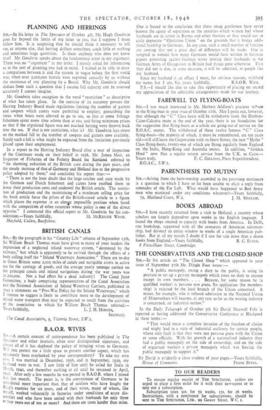PLANNING AND HERRINGS
SIR,—In his letter in The Spectator of October 4th, Mr. Hugh Goodwin goes far beyond the limits of my letter to you, but I suppose I must follow him. It is surprising that he should think it necessary to tell me, or anyone else, that herring drifters sometimes catch little or nothing and sometimes large quantities. Is there anybody who does not know that? Mr. Goodwin speaks about the fundamental error in my argument. There was no " argument " in my letter. I merely asked for information as to the sort of planning you had in mind. I wished to be able CO draw a comparison between it and the system in vogue before the first world war, when over 2,000,000 barrels were exported annually by us without the assistance of any planning by a Board. Why Mr. Goodwin should deduce from such a question that I assume full capacity can be assessed accurately I cannot imagine.
Mr. Goodwin takes exception to the word " restriction " as descriptive of what has taken place. In the exercise of its statutory powers the Herring Industry Board made regulations limiting the number of gutters and coopers which curers were permitted to employ; prescribing the times when boats were allowed to go to sea, so that at some fishings fishermen spent more time ashore than at sea; and fixing minimum prices so that if the stipulated figure was not reached herring were thrown back into the sea. If that is not restriction, what is? Mr. Goodwin lays stress on the marked fall in the number of coopers and gutters now available. Surely such a fall is what might be expected from the limitation previously placed upon their employment.
In a report to the Herring Industry Board after a tour of inspection of the Continent made on their behalf in 1938, Mr. James Mair, an Inspector. of Fisheries of the Fishery Board for Scotland. referred to " the alarming reduction of the British cure during the past years, and the steady increase of that of Germany and Holland due to the progressive policy adopted by them," and concluded his report thus :— " There is not the least doubt that the large catches and cure made by the German and Dutch fishermen and curers have enabled them to lower their production costs and undersell the British article. The restric- tion of production and the maintaining of a minimum selling price for the fresh article force the prices of the British-cured article to a figure which places the exporter in an alinie impossible position when faced with the competition of other countries whose policy is one of the direct opposite." I commend this official report to Mr. Goodwin for his con-






























 Previous page
Previous page